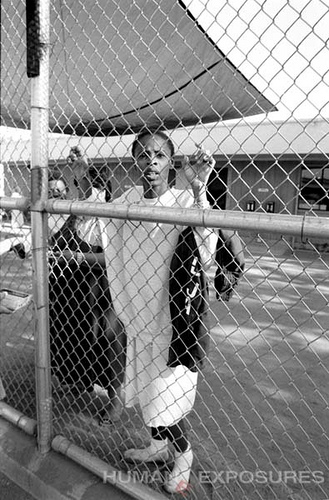As growing numbers of women (up from 40,000 in 2006 to 74,000 in 2011) suffer in Latin American jails on drug-trafficking charges, their role in organized crime is under examination, as are the prison system that crowds and mistreats them and the patriarchal society that systematically fails them.
According to an October 2013 paper by the International Drug Policy Consortium (IDPC), most female prisoners are incarcerated because of drug-related crimes – usually trafficking. In Brazil, 60 percent of women prisoners are in jail for trafficking. In Ecuador, only 18.5 percent of female prisoners were in prison for drug offences in 1982, but that figure now stands at 80 percent. The same upward trend is evident in most Latin American countries, where an average of 70 percent of incarcerated women are doing time for drug-related offences.
Why so many women are being held and tried on drug-trafficking charges, as well as what are the devastating impacts of their incarceration on them, their families and broader society, were discussed at a panel discussion at the UN in New York earlier this month, where drug policy experts spoke about the need for both drug policy and prison reform.
So many of the women serving time or waiting to be sentenced were incarcerated for carrying or “muling” drugs. These women, who tend to be uneducated and poor, are usually “on the lowest rungs of the crime ladder”, according to the briefing report.
The poorly paid “mules” carry drugs in their luggage, strapped to their bodies or swallowed in capsules. Usually several of them are put onto international flights so that even if some are caught, others will get through.
According to the researchers:
Many of these women seemed unaware of the risks involved when drawn into the trade by their partners or families, who would tell them: ‘Just carry this. Nothing will happen; everything will be all right.’
Corina Giacomello, panelist and author of the IDPC briefing paper, Women, Drug Offenses and Penitentiary Systems in Latin America, said analyzing the plight of these women was an opportunity to confront three intersecting problems: gender issues, drug policy and prison policy:
We don’t usually see the connections between these issues, but these women are like a mirror; they’re an intersection of all these things.
Once these women are inside, the exploitation and abuse continue. Most of the women lack the knowledge or money to access lawyers and so may spend years awaiting trial. According to a January 2014 report by the Organization of American States, most women jailed on drug offences are awaiting trial as prisoners.
They are usually separated from their children – or housed together with them in abysmal conditions. Latin America’s prisons are already infamous for overcrowding, inhumane conditions, violence and lack of any rehabilitation programs. Added to this is the sexual exploitation of women who are repeatedly raped by prison guards and other inmates. “Prison is a masculine space built by men for men,” said Giacomello, adding that the penal system is ill-equipped to cope with the rapidly growing numbers of female prisoners who may be pregnant, nursing or mothers of small children.
When women are sentenced, they tend to get stigmatized, and when they start their sentences they are often abandoned; they don’t get visited. These unfortunate women can spend months without seeing their children. This leads to all kinds of health and mental health problems. The OAS reported, “In addition to the potential breakdown of their families, abandonment by their parents and loss of property, incarcerated women face disproportionate levels of social stigmatization.”
Leonel Briozzo, Uruguay’s vice minister of public health, told the panel that prisons were places where people could learn more about illegal activity rather than rehabilitate themselves:
We have to understand that jails are not the correct places for people to stop using drugs. Real transformation needs to take place.
Among the recommendations are initiating more campaigns to make women more aware of the risks of trafficking drugs, as well as applying the UN’s Bangkok Rules to cater more effectively for the needs of women in the prison system.
Giacomello said:
For too long drug policy has stayed in a kind of ivory tower, divorced from human rights or gender policy. We need to make drug policy penetrable from a human rights perspective.










